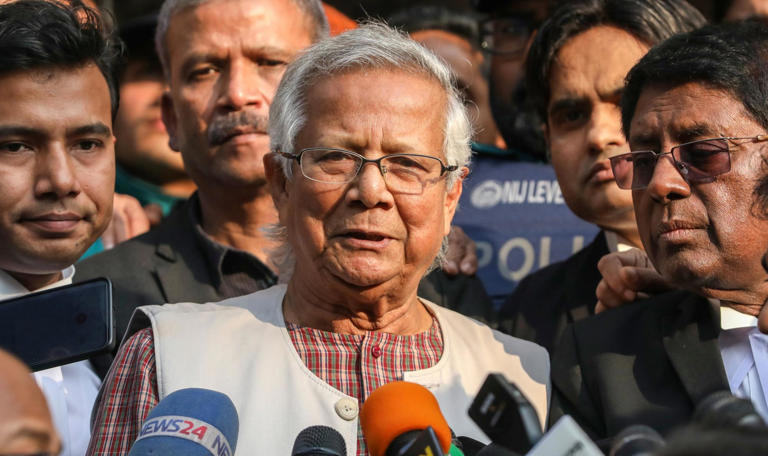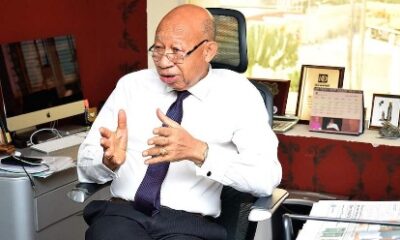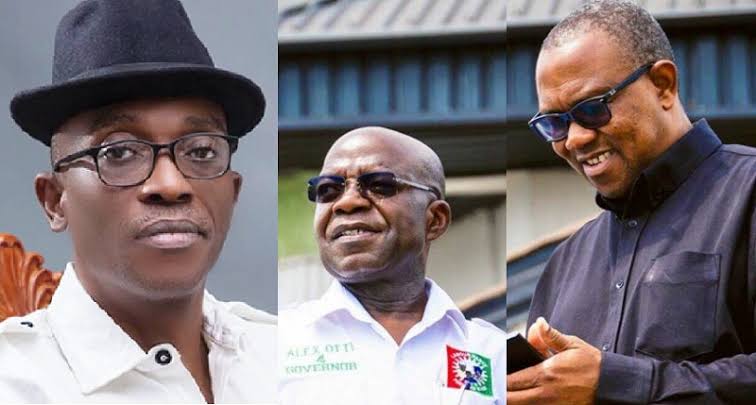Politics
Nobel laureate Muhammad Yunus to head Bangladesh’s interim government
Published
8 months agoon
By
Ekwutos Blog
Story by Redwan Ahmed in Dhaka, Guardian staff and agencies
Nobel laureate Muhammad Yunus will head Bangladesh’s interim government after longtime prime minister Sheikh Hasina fled the country amid a mass uprising that left hundreds of people dead and pushed the South Asian nation to the brink of chaos.
The decision, announced early on Wednesday by Joynal Abedin, the press secretary of the country’s figurehead President Mohammed Shahabuddin, came during a meeting that included military chiefs, organisers of the student protests that helped drive Hasina from power, prominent business leaders and civil society members.
A longtime political opponent of Hasina, Yunus is expected to return from Paris, where he is advising Olympic organisers, on Thursday, when the interim government will also be sworn in.
His lawyers told the Guardian that a Dhaka court had overturned a conviction for labour law violations – one of scores of charges against him in the courts that Yunus said were part of a legal campaign of harassment prompted by Hasina.
An economist and banker, he was awarded the 2006 Nobel Peace Prize for his work developing microcredit markets. Yunus has been hailed for bringing thousands out of poverty through Grameen Bank, which he founded in 1983, and which makes small loans to businesspeople who wouldn’t qualify for regular bank loans.
Related: Sheikh Hasina: child of the revolution who eroded Bangladesh’s democracy
Other members of the new government would be decided soon, after discussions with political parties and other stakeholders, Abedin said. The president had dissolved parliament on Tuesday, clearing the way for an interim administration and new elections.
Shahabuddin also ordered the release of opposition leader Khaleda Zia from house arrest, a longtime Hasina rival who was convicted on corruption charges in 2018
Yunus, who had called Hasina’s resignation the country’s “second liberation day,” had faced corruption charges during her rule that he derided as politically motivated. He could not immediately be reached for comment, but a key organiser of the protests, Nahid Islam, said he had agreed to head the interim administration.
Islam said protesters would propose more names for the Cabinet and suggested that it would be difficult for those in power to ignore their wishes.
Hasina fled to India by helicopter as protesters defied a military curfew to march on the capital, with thousands eventually storming her residence and other buildings associated with her party and family.
Related: Under threat of jail, microfinance pioneer vows to keep lending to poorest Bangladeshis
The news that Yunus would lead the interim government came amid reports that Bangladesh’s army chief, Gen Waker-Uz-Zaman, told Hasina’s office that troops would not be able to enforce a curfew she had called for amid the protests, the night before she fled the country.
Hasina’s army chief held a meeting with his generals and decided that troops would not open fire on civilians to enforce the lockdown, according to two serving army officers with knowledge of the discussions, according to Reuters.
On Monday, Hasina resigned and fled the country after at least 300 people were killed in a crackdown on demonstrations that began as student protests against preferential job quotas and swelled into a movement demanding her downfall.
Students said the quota system disproportionately allocated government jobs to the descendants of freedom fighters from the 1971 independence war. The violence worsened on Sunday when 91 people were killed in nationwide clashes – the deadliest day since the protests began in July.
Zaman has not publicly explained his decision to withdraw support from Hasina and she could not be reached for comment. Her son and adviser, Sajeeb Wazed, also did not respond to repeated requests for comment, according to Reuters.
But India’s foreign ministry said on Tuesday that Hasina apparently decided to resign after a meeting with the leaders of the security forces. She then requested at short notice permission from New Delhi to come to India while Bangladesh authorities simultaneously sought flight clearance. According to the latest information, she is still in India.
Hasina, who has ruled Bangladesh for 20 of the last 30 years, was elected to a fourth term leading the country of 170 million in January, after arresting thousands of opposition leaders and workers. That election was boycotted by her main rivals.
Reuters contributed to this report
You may like


Champions League quarter-final: Arsenal thrash Real Madrid as Inter beat Bayern


US tariffs won’t have much effect on Nigeria – FG


Wike hosts suspended Rivers lawmakers in UK


Pascal Dozie, Founder Of Diamond Bank Passes Away At 85


Tuface’s lover Natasha Osawaru replaced as Deputy Leader after shake-up in Edo Assembly


Nigeria seeks to host 2030 Commonwealth Games
Politics
Wike hosts suspended Rivers lawmakers in UK
Published
17 hours agoon
April 8, 2025By
Ekwutos Blog
The Minister of the Federal Capital Territory, FCT, Nyesom Wike, on Monday met with the suspended members of the Rivers State House of Assembly.
Wike hosted the suspended lawmakers for a dinner in the United Kingdom, UK.
This followed his earlier meeting with some of his political allies in Port Harcourt, the Rivers State capital, on Sunday.
The meeting was disclosed by the minister’s media aide, Lere Olayinka, via his Facebook page.
According to Olayinka: “Yesterday, the FCT Minister, Nyesom Wike, hosted Rivers State House of Assembly members who are in the United Kingdom for Legislative Capacity Building, to a dinner. Wike left Nigeria on Sunday night after visiting his political friends and associates in Port Harcourt, Rivers State.”
Recall that the lawmakers were suspended by President Bola Tinubu after declaring a state of emergency in Rivers State due to security concerns. Governor Sim Fubara was also suspended for six months. The emergency rule stemmed from the ongoing political crisis between Wike and Fubara.
The crisis had affected the lawmakers and the entire political structure in Rivers State.
The Supreme Court later intervened, ordering the reinstatement of the lawmakers and directing Governor Fubara to present the 2024 budget before the Martins Amaewhule-led Assembly.
However, Fubara’s attempt to present the budget was thwarted as the lawmakers barred him from accessing the Assembly complex.
The suspended lawmakers are currently in the UK for a legislative capacity-building programme.
Politics
Tuface’s lover Natasha Osawaru replaced as Deputy Leader after shake-up in Edo Assembly
Published
1 day agoon
April 8, 2025By
Ekwutos Blog
Blessing Agbebaku and Maria Edeko on Monday retained their positions as the Speaker and the Deputy Speaker of the Edo State of Assembly after a minor leadership shuffle.
Ekwutosblog reports that the duo who are members of the Peoples Democratic Party, PDP, retained their positions following the implementation of a letter sent to the House by the state leadership of the All Progressives Congress, APC.
Agbebaku who read the letter addressed to him by the acting state chairman of APC, Jarret Tenebe, however, announced a minor change in the principal officers of the House.
Charity Aiguobarueghian, PDP, Ovia North-East I, Natasha Osawaru Irobosa, PDP, Egor, and Yekini Idaiye, PDP, Akoko-Edo I, were removed as the Majority Leader, Deputy Leader and Chief Whip of the House, respectively.
Natasha Osawuru is the lover of singer Tuface.
The trio were replaced with Ibhamawu Jonathan Aigbokhan, APC, Esan West as Majority Leader, Addeh Emakhu Isibor, APC, Esan North-East I, and Lecky Hussein Mustapha, APC, Etsako West I as Deputy Leader and Chief Whip of the House, respectively.
The position of the Deputy Chief Whip earlier given to Richard Edosa, Oredo West constituency, was eventually cancelled as there was no such position in the legislature.
The letter dated April 7, 2025, titled ‘Nomination of Principal Officers of the Edo State House of Assembly’, was signed by Tenebe, state acting chairman of APC and Lawrence Okah, the secretary.
Parts of the letter read: “We write to refer you to our earlier correspondence dated 14th March, 2025 to your office notifying you of the majority status of our party, the All Progressives Congress, APC, in the Edo State House of Assembly.
“Consequently, we hereby forward to you the party’s nomination of principal officers’ position in the House.
“Majority Leader, Hon Ibhamawu Jonathan Aigbokhan, Esan West constituency, Deputy Majority Leader, Hon Emakhu Addeh Isibor, Esan North-East I, and Chief Whip, Hon Lecky Hussein Mustapha, Etsako West constituency.”
The majority leader and deputy majority leader are from Edo Central Senatorial District while the Chief Whip, Lecky Hussein Mustapha, is from Edo North Senatorial District.
Recall that Richard Edosa was the only lawmaker elected on the platform of the Labour Party but he recently defected to the APC.
The Speaker, Agbebaku disclosed that the PDP would also bring its list of nominees of principal officers to the House.
He noted that his position as the Speaker and that of the Deputy Speaker were not guaranteed in the ongoing leadership change in the House.
Politics
NEC Meeting: No vacancy in LP leadership – Abure warns Peter Obi, Otti
Published
1 day agoon
April 7, 2025By
Ekwutos Blog
The National Chairman of the Labour Party, Julius Abure on Monday warned there is no vacuum in the party’s leadership.
Abure issued the warning ahead of the party’s National Executive Committee, NEC, meeting called by LP’s former presidential candidate, Peter Obi and Governor Alex Otti of Abia State.
Speaking at a public conference at the party secretariat, Abure described Obi and Otti as betrayals.
He noted that the Supreme Court was clear in its judgment, stressing that LP matters are internal affairs of political platforms.
According to Abure: “Tell them that there is no vacancy in our party. In the Labour Party, we don’t betray our candidates even though some betray us after giving them tickets.
“We also want to urge those who have been deceived by last week’s misleading interpretation of the Supreme Court judgment to disregard the speculation. I remain the National Chairman of the Labour Party.
“Again, the Labour Party Constitution does not recognise the setting up of a caretaker committee for party affairs.”
Ekwutosblog had reported that Obi and Otti had called for a NEC meeting scheduled to hold on Wednesday in Abuja.
The duo said the meeting would be followed by a town hall engagement with major stakeholders at the Transcorp Hilton in Abuja.

Champions League quarter-final: Arsenal thrash Real Madrid as Inter beat Bayern

US tariffs won’t have much effect on Nigeria – FG

Wike hosts suspended Rivers lawmakers in UK
Trending

 Trending6 months ago
Trending6 months agoNYA demands release of ‘abducted’ Imo chairman, preaches good governance
- Business6 months ago
US court acquits Air Peace boss, slams Mayfield $4000 fine

 Politics6 months ago
Politics6 months agoMexico’s new president causes concern just weeks before the US elections
- Entertainment6 months ago
Bobrisky transferred from Immigration to FCID, spends night behind bars
- Entertainment6 months ago
Bobrisky falls ill in police custody, rushed to hospital

 Politics6 months ago
Politics6 months agoRussia bans imports of agro-products from Kazakhstan after refusal to join BRICS

 Politics6 months ago
Politics6 months agoPutin invites 20 world leaders
- Politics1 year ago
Nigerian Senate passes Bill seeking the establishment of the South East Development Commission.

